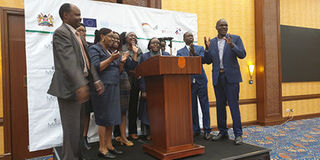Premium
Farmers in 12 counties to benefit from Sh400m EU fund

Stakeholders celebrate the launch of the Sh400 million Market Access Upgrade Programme in Nairobi on October 29, 2019. The project will benefit farmers in 12 counties to access local and international markets. PHOTO | RACHEL KIBUI | NATION MEDIA GROUP
What you need to know:
- The four-year project was launched on Tuesday at a Nairobi hotel.
- The Markup Programme aims to enhance market access and competitiveness of Kenya’s plant-based products.
- It is targeted to benefit about 1,500 farmers directly, and many more indirectly.
The European Union (EU) will spend USD3.7 million (Sh425.5 million) to address supply and market access constraints in several agricultural value chains.
This will be done through a project dubbed Market Access Upgrade Programme (Markup) Kenya which will be implemented by United Nations Industrial Development Organisation (Unido) in 12 counties across the country.
The four-year project was launched on Tuesday at a Nairobi hotel in an event that brought together agriculture stakeholders.
ENHANCE MARKET ACCESS
The Markup Programme aims to enhance market access and competitiveness of Kenya’s plant-based products through the adoption of relevant international standards and improved food safety regulation and enforcement in Kenya.
Under the project, small scale farmers and small and medium enterprises will receive capacity building along selected value chains. These value chains include green beans, snow peas, chilies, mango, passion fruits, macadamia, ground nuts, herbs and spices.
In addition, services provided by national institutions such as the Kenya Plant Health Inspectorate Service (Kephis), the Horticultural Crops Directorate (HCD) and the Kenya Bureau of Standards (Kebs) will be strengthened. This will ensure that all the agricultural exports meet the market requirements for both the export and domestic markets and are safe for public consumption.

EU head of agriculture, job creation and resilience Myra Bernardi address stakeholders during the Markup project launch in Nairobi PHOTO | RACHEL KIBUI | NATION MEDIA GROUP
VALUE CHAINS
“This programme will benefit stakeholders across the target value chains, including farmers, traders and government institutions,” said Myra Bernardi, EU’s head of agriculture, job creation and resilience.
This project, she noted, is aimed at increasing the quality and quantity of agricultural exports as well as expanding markets within the country and in the East African region.
The project will also focus on creating awareness on non-tariff barriers to international trade and work with Kenyan institutions to address sanitary and phytosanitary barriers to trade.
“We are looking at increasing market access for high value products and benefit not only stakeholders along the value chains but also people across the country,” said Ms Bernardi.
1,500 FARMERS
It is targeted to benefit about 1,500 farmers directly, and many more indirectly, according to Unido’s programmes manager for agribusiness Yvonne Lokko.
“If we work with 100 farmers in a particular county for example, it will spill over to other farmers in the neighbourhood,” says Ms Lokko.
While there will be focus on the export market especially the EU, this project will also enhance standards locally.
This is especially because stakeholders will be producing for the export as well as the local market.

Stakeholders follow proceedings during the Markup project launch in Nairobi on October 29, 2019. PHOTO | RACHEL KIBUI | NATION MEDIA GROUP
INTERNATIONAL STANDARDS
“If an importer wants a specific shape of a produce for example, those that are not of the same shape will be sold in the local market, but the standards will be of international level,” notes Yvonne.
The project will therefore play a key role in not only enhancing the food security and improving livelihoods in line with the government’s Big Four Agenda.
In a bid to ensure young people are included in the project, the youth will be trained so that they understand the right standards for the targeted value chains.
Markup Kenya National Coordinator Andrew Edewa said technologies will be employed and will be attractive especially among young people.
In collaboration with the relevant counties, Dr Edewa added, extension officers will be trained as they are the ones who reach out to farmers.





